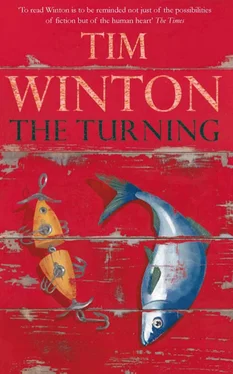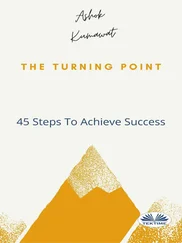And you, the tin god. They could blame you for everything that’s ever happened to me, everything I’ve put em through.
Dyson went cold. He held on to the bench and stared at her. God, how thoroughly she saw through him. He never really knew if Fay regretted the abortion they’d obtained all those years ago, but she gauged him well enough to sense how it ate at him. And she knew where his real vanity lay, what it would cost him to be reviled by her parents. When Fay took off to leave them in the lurch again, how could he live here in town with them, meeting them at the school gate every morning? What would he be to them, then, the killer of their unborn grandchild?
Pete, if I leave this house and go down to the trawlers and score tonight, what’re you gonna tell them? That you turned me away? Ruined my recovery like you ruined me before?
Did I, though? he murmured. Ruin you. Is that how it was?
She laughed and put the mug on the bench.
There was a thud from the livingroom and Fay turned, startled.
Ricky? she called.
Dyson slipped past her and saw a log fallen out onto the hearth. A plume of smoke rose in the room and he kicked the smouldering wood back into the grate. He leant on the mantle to get control of himself.
Fay stood in the middle of the room waving smoke away. Her manic mood had broken.
So that’s a no, then?
It’s a no, Fay. Regardless.
It’s blackmail, she said. I know.
It’s vicious.
You think I’d do it? she asked, smiling. You think I’d tell them?
No, he whispered prayerfully. Because you love them. I think you love your daughter. You’ve come too far, Fay. Too much self-respect.
Dyson wondered if it might be true, whether she had any pity in her at all.
Well, said Fay. I spose we’ll see, won’t we?
Yes, Dyson said turning back to the smouldering log in the grate. I guess we will.
He kept his back to her.
The door shut so quietly that he had to turn around to see that she was gone.
I WAS SIXTEEN when the old man shot through. A year later we moved back to the city where my mother cleaned houses to pay off his debts and keep us afloat and get me through university. She wouldn’t let me get a part-time job to pay my way. The study, she said, was too important. Cleaning was a come-down from her previous job, eighteen years before, as a receptionist in a doctor’s surgery, but it was all she could get. She told me there was more honour in scrubbing other people’s floors than in having strangers scrub your own. But I wasn’t convinced. The only thing worse than knowing she knelt every day in someone else’s grotty shower recess was having to help her do it. Some days, between lectures, I did go with her. I hated it. There were many other times when I could have gone and didn’t. I stayed home and stewed with guilt. She never said a word.
My mother had a kind of stiff-necked working class pride. After the old man bolted she became a stickler for order. She believed in hygiene, insisted upon rigour. She was discreet and deadly honest, and those lofty standards, that very rigidity, set her apart. Carol Lang went through a house like a dose of salts. She earned a reputation in the riverside suburbs where, in time, she became the domestic benchmark. She probably cleaned the houses of some of my wealthy classmates without any of us being the wiser.
She was proud of her good name and the way people bragged about her and passed her around like a hot tip, but I resented how quickly they took her for granted. I’d seen their patronizing notes on floral paper, their attempts to chip her rate down. The householders who thought most highly of themselves were invariably the worst payers and the biggest slobs. It was as though having someone pick up after them had either encouraged them to be careless or made them increasingly determined to extort more work for their money. Through it all, my mother maintained her dignity and her hourly rate. She left jobs, she did not lose them.
In twenty years she was only ever sacked the once, and that was over a pair of missing earrings. She came home with a week’s notice and wept under the lemon tree where she thought I wouldn’t hear. I tried to convince her never to return but she wouldn’t hear a word of it. We argued. It was awful, and it didn’t let up all week. Since the old man’s disappearance we’d never raised our voices at each other. It was as though we kept the peace at all costs for fear of driving each other away. And now we couldn’t stop bickering.
The morning she was to return we were still at it. Then, even while I took a shower, she stood in the bathroom doorway to lecture me on the subject of personal pride. It was as though I was not a twenty-year-old law student but a little boy who needed his neck scrubbed.
I don’t care what you say, I yelled. It’s outrageous and I’m not coming.
I never asked you, she said. When did I ever ask you to come?
I groaned. There was nothing I could say to that. And I knew it was a four-hour job, two if I helped out. Given what the householder had accused her of, it would be the toughest four hours she’d ever put in. But I was convinced that it was a mistake for her to go back. It was unfair, ludicrous, impossible, and while she packed the Corolla in the driveway I told her so. She came back for the mop and bucket. I stood on the verandah with my arms folded. But she must have known I’d go. She knew before I did, and not even the chassis-bending slam I gave the door could wipe the look of vindication from her face as she reversed us out into the street.
The car reeked of bleach and rubber gloves. I sighed and cranked down the window. She drove with both ravaged hands on the wheel, her chin up at a silly, dignified angle. Her mask of composure belied a fear of driving, and the caution with which she navigated made me crazy, but I resolved to show a bit of grace.
What? she said, seeing something in my face.
Nothing, I said, trying not to sound sullen.
You’re good to come with me.
Well. Figure you need the help.
Oh, it’s not help, love. It’s company.
I could have opened the door and got out there and then.
What? she asked.
I shook my head. I couldn’t launch into it all again. She was worth twice what those silvertails paid her. She was more scrupulous, more honest, than any of them. She wouldn’t even open a drawer unless it was to put a clean knife or fork into it. For her to be called a thief was beyond imagining.
I know it’s not easy, she said.
It’s demeaning, Mum! I blurted despite myself. Going back like this. The whole performance. It’s demeaning.
To who?
Whom.
Well, excuse me, constable! she said with a tart laugh. To whom is it demeaning, then, Victor? You?
I looked out of the window, flushing for shame.
You men, she said brightly.
Actually, this is about a woman, Mum. What kind of person accuses you of thieving, gives you the sack and then asks you back for one week while she looks for somebody to replace you?
Well, it’s her loss, said my mother, changing lanes with excruciating precision. She knows she won’t find anybody better than me.
Not even as good as you. Not a chance.
Thank you.
Five-hundred-dollar earrings, Mum. She hasn’t even gone to the police.
As far as we know.
In that postcode? Believe me, we’d know.
She must know I didn’t steal them.
She just wants something, some advantage over you. There’ll be a note there, you wait. She’ll let it slide — this time — and later on, while you’re all guilty and grateful, she’ll chip you down on the rate. Back to a fiver an hour.
The Law, she said. It must make you suspicious. She’s just made a stupid mistake. She’s probably found them by now.
Читать дальше












